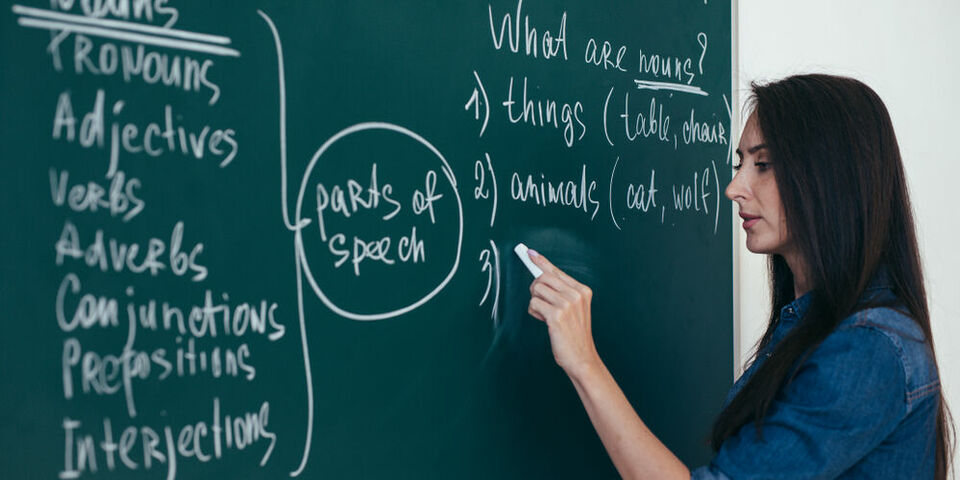Minister wants institutions to think hard about their language policy
Minister of Education, Ingrid Van Engelshoven, will take stricter measures against institutions that fail to justify their choice for programs taught in a foreign language. She demands carefully considered plans from institutes of higher vocational education and universities. TU/e has both a code of conduct and a language policy note. The code of conduct may possibly be adjusted, depending on the legislative process.
Institutions of education that offer programs taught in a different language are obliged to have a code of conduct in which they account for the working language. But almost half of all 77 institutes of higher vocational education and universities does not have one, according to a report published by the Dutch Inspectorate of Education last year. Their conclusion caused some raised eyebrows in the House of Representatives.
According to minister Van Engelshoven, some institutions have by now drafted a code of conduct or are working on one. In response to written questions, the minster says she wants everything to be in order for coming academic year. Institutions that fail to show improvement will face financial sanctions, and non-government funded institutions may lose their authority to award degrees.
TU/e has drawn up both a code of conduct (2016) and a language policy note (2018). According to Paul Koenraad, dean of TU/e’s Graduate School, this code of conduct for language policy may possibly need some adjustments in light of the current political discussion. “I think our affairs are in order, and I’m fairly confident about the discussion in the House of Representatives.”
The minister is currently drafting a legislative proposal about language and accessibility. In it, she wants to lay down the principle that programs taught in a foreign language are possible only when they are “essential for the acquirement of knowledge, insight or capabilities” of graduates.
Van Engelshoven wants institutes of higher vocational education and universities that wish to offer programs taught in a foreign language to present carefully considered plans. For example, the university board needs to stipulate that a program remains accessible to Dutch-speaking students, and it needs to guarantee the quality of education as well.
Origin
Under current rules, a program may be taught in a foreign language when “the specific nature, method or quality of education, or the origin of students makes it necessary.” Liberal party VVD referred to the origin criterion as a “self-fulfilling prophecy,” because it is “only logical that a program taught in Dutch will not attract students with little or no command of the Dutch language.” The VVD wanted to know how the minister intends to ensure that this criterion will not be used as a recruitment tool to attract more international students.
Van Engelshoven will remove this criterion from her proposal. “The few instances in which a large number of foreign students enroll in a program – often because an institution offers this program in a different language – should not be the only reason to offer this program in a different language,” the minster writes.
Task
Several political parties worry about the Dutch language skills of students if their complete program is taught in a different language. Van Engelshoven believes it is the legal task of institutes of higher vocational education and universities to see to this. She points out that institutions often work on maintaining both Dutch and English language skills already.
Paul Koenraad: “Our language policy note and code of conduct state that we also pay attention to the development of Dutch language skills. In this context, it’s important to note that the working language for Biomedical Engineering is partly Dutch. There is no centrally imposed policy that every program should be taught in English.”
The minister further wants to give the education committees a bigger role. If it were up to the minster, the committees would have right of consent for the education and examination rules (OER), which should stipulate the working language for education and exams. And what is the role of the representative advisory council, liberal-democratic party D66 wanted to know. That is up to the institutions to decide, the minster says.
There is no right of consent for the code of conduct and language policy in general, purely by virtue of law, says TU/e policy advisor Dirk-Jan Mulders. “It is not legally required to include it in the OER, but TU/e has included the working language in its model OER’s. The departmental council has right of consent, and the education committee has advisory right on the working language of a program based on this. The code of conduct is described in TU/e’s student statute and the University Council has right of consent. The language policy document was approved by the University Council as well.”
Teachers
Nearly half of all institutions make no mention whatsoever of the language level of their teachers in their code of conduct. Green political party GroenLinks wanted to know what the minister intends to do to ensure that teachers have an adequate command of the language. Van Engelshoven once again refers to the institutions. They need to make an effort to ensure high-quality education, and maintaining the command of language of teachers “may play an important role” in this.
The minster strives to send her proposal about language and accessibility to the House of Representatives this summer.


Discussion